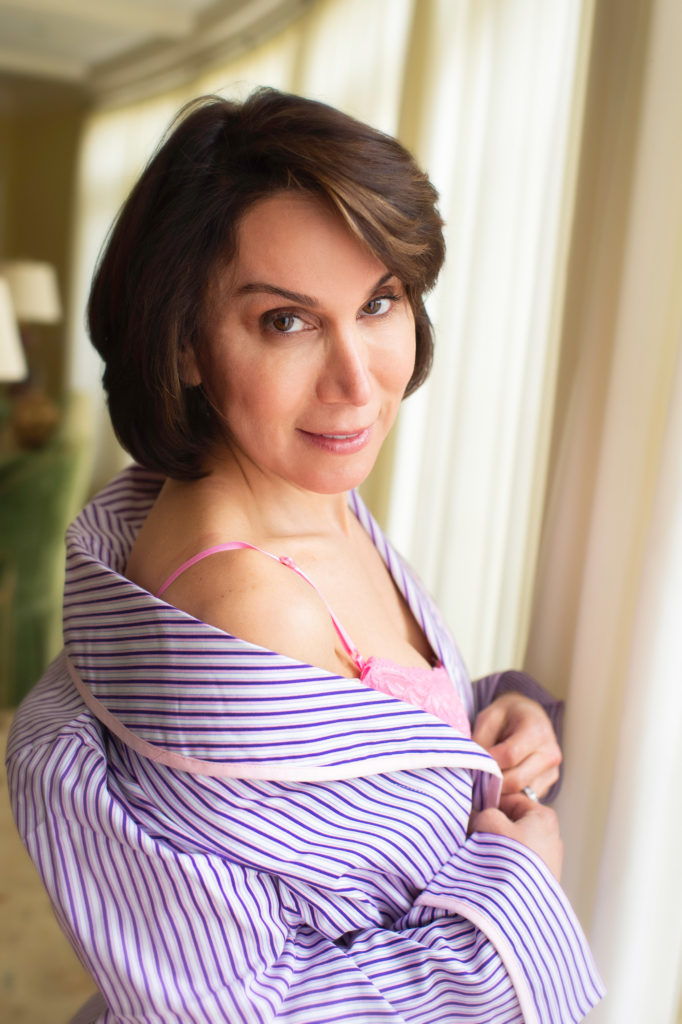
Our bodies over 50: Are you with Me?
My fifteen-year-old daughter and my almost 53-year-old self are in the same place with our bodies. The reality is that her breasts rise to the sun and mine, tracking downward; Puberty and Menopause are at the opposite end of the female biological aging spectrum, but from body awareness and knowledge perspective, we’re both pretty much in third grade. We are simpatico about being in physical transition and experiencing and handling the feelings around those changes. She’s discovering her ins and outs, literally, and I’m observing what’s staying in place and what’s moving out. Sure, her recipe of change is clearly documented, disseminated, and openly discussed; there are school sex-ed classes, websites devoted to teenage physical, emotional and sexual development, and the most wide-ranging assortment of products to ease her transition into “womanhood.” Puberty and sexuality go hand-in-hand in her developmental world. A lot of energy effort goes into the mantras for girls her age to understand and value themselves first. How they feel about themselves translates into how they are treated. She’s got teachers, counselors, doctors all supporting her and elevating her status as a newly minted woman.
Now, for me, Menopause (or rather perimenopause), I’m in a bit of a desert, in information, awareness, and support. I’ve bookmarked a jumble of newsletters, fashion blogs, and “over 50” Instagrammers for the Menopause headlines. On the care side, I have an assortment of unrelated doctors to help me through my “transition.” No one single expert on Menopause and how to find what will work for me. What’s hardest, though, is the isolation. No one really wants to talk about Menopause very much. If you’re going through it, you don’t announce it. If you’re having symptoms, call a doctor or look it up—kind of like throwing darts with a blindfold on. For me, the “newly minted” 52 ½-year-old woman, I feel like I’m climbing a mountain with no summit in sight and hoping I’ll get to the other side.
Who to talk to!
Learning about women’s needs has been the life’s work of Kate Roberts, a longtime researcher for Population Services International and a founder of the Maverick Collective, an organization dedicated to the wellbeing of women and girls all over the world. She studied firsthand the lives of countless women, their cultures, their communities, and their health. She has founded a company earmarked for filling the huge gap of women’s health, education, and community building. She’s got a great perspective on women and knows what the future of women’s health should look like.
What separates you from the pack of women starting to explore and address the needs of women as they turn the corner into the second half of life, before, during, and after Menopause? How do you plan to distinguish your new company, The Body Agency, in the term I’m coining, the “Menopause Marketplace?” How do you know what women really need and want?
Perspective. I have seen everything. I have studied women for the last thirty years in the non-profit and profit arenas, examining reproductive health and everything that goes on with women –how they live, where they love, how they’re socialized, marginalized, celebrated. I’ve sat with women on floors of huts and in makeshift hospitals, witnessed their forced marriages and hardships. Women from all over have opened up to me about what their lives are like. I have seen what they need.
What I have found is that the basics of female reproductive care are marginalized in so much of the world, not just in third-world countries. I have encountered so many women who have no access to contraception, let alone things like, lube or even some of the basics of feminine hygiene. I have watched women give birth without a midwife, with no help. I have seen hospitals with as many as six women with their newborns in one bed or just lying on the floor. There is a massive gap in women’s health care (everywhere), so armed with this knowledge of what’s needed; I founded The Body Agency.
Agency literally means action or intervention to cause an effect.
Tell me about your company, The Body Agency.
I believe that women should have agency over their own bodies. They need to have the ability to make decisions for what they do with and for their bodies, what they want with their bodies, and anything they need to make that happen. Women need products, correct and useful information and the ability to have a dialogue about their bodies, their health, and wellbeing. (The Body Agency will provide all of those things)
You do so much in the world for so many people. Was there a particular catalyst that sparked the Body Agency’s conception?
Well, around my fiftieth birthday, I realized something was happening to me. I didn’t feel quite right. I was tired with loss of sleep and I was gaining weight. I initiated my own search for a solution. I knew I wanted a natural and even alternative method of treatments for my (perimenopause and menopause) symptoms. I learned how to eat for my body’s needs (intermittent fasting and Keto), I found Ayurvedic remedies for my discomfort, natural supplements, and the right combinations of vitamins and minerals. I had access to the best information, great doctors, and nutritionists; I had blood tests and got the care I needed, and found solutions I wanted. And I realized I wanted every woman to have access to what I had done for myself. I am making that happen with The Body Agency.
What does The Body Agency mean for women like you and me?
The Body Agency has three components. It provides education, products and is a communication hub for women to share experiences, information, and resources. The Body Agency will make it easy for women to find the information they need to learn about their bodies, symptoms, changes, and care, like a WebMD solely for Women’s Health. In addition, they will be able to get all-natural products sourced and developed by The Body Agency to help them feel better. Lastly, they will have support from experts and women like themselves.
What’s your ultimate goal? For yourself and for women in the heart of Mid-life and beyond?
I see myself as a social entrepreneur in the broadest sense. I want to change the way society sees women. For example, in the last twenty years, the word Menopause hasn’t been uttered in ordinary conversation. We dance around it avoid it. “ The Change” word and it is such an important part of our life and our society’s. We can talk about birth control, we can talk about abortion, but we can’t talk about Menopause? That’s got to change. I want the dialogue of women’s health to extend beyond the trajectory from puberty and childbirth to Menopause and sexuality. Look, if we can talk about the penis, we should be able to talk about the clitoris. I want to see women’s health to be a complete circle of growth; to be an all-encompassing definition including perimenopause, Menopause, and women’s sexual wellbeing throughout that continuum.
Look, I have trouble accepting my changing body; I know it’s a process. If I am struggling, how on earth is society going to accept me? Demi Moore posed pregnant on the cover of Vanity Fair in 1991, upending the visual archetype of womanhood. The 2004 Dove Campaign for Real Beauty started the push to redefine beauty by conveying that any body at any age is beautiful. What do you think can be done to normalize and celebrate the Menopausal Woman?
It’s universal that there’s a lot of stigma about a woman’s body. In so many cultures, especially in, say, the Muslim Culture, a woman’s body, not even wrists or ankles, can be shown, let alone discussed. Regardless of such extremes, it does not change the fact that our bodies belong solely to us. And that needs to be a message that is normalized and celebrated. For a woman to feel comfortable and proud of her body. That message is powerful. It will drive women to find solutions for not just their physical health but their sexual health too. The key to all of this is getting women the information they need to make decisions to help them get what they want out of their sexual life. Why shouldn’t that same Muslim woman buy The Body Agency’s Ayurvedic Warming Oil to use on any body part, anytime she wants. (That’s the message I want to send to every woman)
Many of the women I have talked to, discuss feeling invisible or less-important now that they’re older? Is this universal?
In other cultures, women who are past child bearing years are esteemed. They are considered “wise ones.” The community seeks them out for advice and guidance. Having raised their children, run their homes, and served their villages empowers them. Our society could use this perspective and really take into account all of the women leaders, innovators and
Of all of the women I know, even with the three mothers I have over 75, I’m just going to ask you because you’ve pretty much seen it all, am I really going to be having sex at 70, 80, or even 90?
Well, that’s really dependent on your partner, isn’t it?
Now. I’m thinking…”I’d better get my husband a trainer!”
Please share your thoughts with me and our community!


